EVENTS 
|
Friday, October 7
4:00 PM - 5:00 PM
Gerald Ford Library
Monday, October 10
3:00 PM - 6:00 PM
Tuesday, October 11
8:00 AM - 2:15 PM
Towsley Center
Monday, October 10
8:30 AM - 10:30 AM
Danto Auditorium, CVC
3:00 PM - 4:00 PM
NCRC Building 10, Research Auditorium
Wednesday, October 19
2:00 PM - 3:00 PM
NCRC Building 16
Wednesday, October 19
6:00 PM - 7:30 PM
Techtown Detroit
Dinner Provided
Wednesday, October 19
6:00 PM - 9:00 PM
Kahn Auditorium, BSRB
Wednesday, October 19
1:30 PM - 5:30 PM
Tuesday, October 25
1:30 PM - 5:30 PM
Tuesday, November 29
8:00 AM - 12:00 PM
Danto Auditorium, CVC
Identical Sessions
Friday, October 21
10:00 AM - 12:00 PM
AAT-BSRB
Friday, October 21
12:00 PM - 1:00 PM
Taubman Health Sciences Library, Room 5000
Lunch Provided
Tuesday, October 25
9:00 AM - 12:00 PM
BSRB Seminar Rooms,
1st Floor
Breakfast & Lunch Provided
7:30 AM - 9:00 AM
Ford Auditorium, University Hospital
Light Breakfast Provided
Wednesday, November 16
2:00 PM - 4:00 PM
NCRC
Thursday, November 17
8:00 AM - 12:00 PM
BSRB Seminar Rooms,
1st Floor
Breakfast Provided
|
RESEARCH NEWS 
|
QUICKLINKS 
|
|
 |
|
 Leadership Leadership
|
 Funding Funding
|
 Training & Professional Development Training & Professional Development
|
 Announcements Announcements
|
|
Select Research Funding &
Award Opportunities
|
|
Award
|
Deadline
|
|
|
Friday, November 11
|
|
|
Saturday,
December 31
|
Bridging Support
Other Opportunities
|
Award
|
Deadline
|
|
|
Wednesday,
October 12
|
|
|
Monday, October 17
|
|
|
Monday, October 17
|
|
|
Monday, October 17
|
|
|
Monday, October 17
|
|
|
Monday,
December 5
|
|
|
Monday,
December5
|
Featured Foundation Grants
Visit the UMHS Corporate and Foundation Relations
website for more foundation funding opportunities.
|
|
New Leadership at the Comprehensive Cancer Center
|
Dr. Eric Fearon Named Director
|
Fearon, the Emanuel N. Maisel Professor of Oncology, is a nationally-recognized investigator in cancer genetics. His research has led to a greater understanding of gene defects that cause colon and rectal cancer to develop and spread.
|
"Our Cancer Center has a history of success, with many exciting recent and ongoing initiatives. I am honored to have the opportunity to continue moving us forward."
- Eric Fearon, Director of U-M Comprehensive Cancer Center
|
In addition to the Dr. Fearon's appointment, four new leaders were also named last month.
- Pavan Reddy, M.D., Deputy Director
- Alnawaz Rehemtulla, Ph.D., Associate Director for Shared Resources
- Anne Schott, M.D., Associate Director for Clinical Research
- Stephen J. Weiss, M.D., Associate Director for Basic Science Research
|
Have A Great Biomedical Innovation That Could Improve Patient Care?
|
Coulter Program announces 2017 Call for Proposals
|
 |
|
The U-M Coulter Translational Research Partnership Program "Coulter Program" is pleased to announce the 2017 Call for Proposals. Proposals will be accepted beginning November 1, 2016. The deadline for proposal submission is February 3, 2017.
The Coulter Program funds collaborative translational research projects between Engineering and Clinical faculty co-investigators. The goal of the program is to accelerate development and commercialization of new medical devices, diagnostics, and other biomedical products that address unmet clinical needs and lead to improvements in healthcare.
Coulter funding (typically $100,000 range for 1 year) does not require a departmental funding match or cost-sharing of salaries.
|
Proposal Submission Begins:
Tuesday, November 1
Proposal Deadline:
Friday, February 3, 2017
|
Distinctive aspects of the Coulter Program include business assessment work that dovetails with technical milestones for each project. Specific benefits to each project include:
- New product planning support
- Business development support
- Market research
- Regulatory guidance
- Follow-on funding guidance
- Mentorship from the Oversight Committee
- The C3i Commercialization Planning Program
|
|
Rachel Upjohn Clinical Scholars Seek Award Applicants
|
Proposals due by
Monday, December 5
|

The Rachel Upjohn Clinical Scholars program supports U-M early career faculty who are members of the Depression Center and interested in engaging in the research of mood disorders.
The program is currently seeking applications for its 2017 awards, which will support research in the etiology and treatments that will impact the future care of depression, bipolar, and related disorders. The opportunity for a $50,000 award is available to clinical and research faculty members, lecturers, or any rank up to assistant professors who are members of the Depression Center. If you are interested in becoming a member, please
click here.
Successful projects will be considered to have a high probability of progression along an independent research trajectory. It is anticipated that the successful candidate will use the resources of this award to support his or her own innovative research that will lead to original publications and grant applications.
Proposals should contain a narrative of no more than six pages and are due by Monday, December 5. For more information and
specific details about additional application and reporting requirements, visit Competition Space.
|
Call for Abstracts and Art
|
Join the Taubman Medical Research Institute for the 9th Annual Taubman Institute Symposium
|
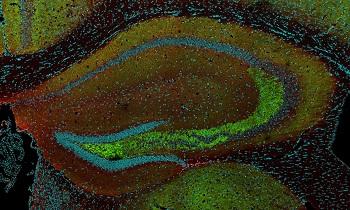
As part of the 9th annual Taubman Institute Symposium, which will take place on Friday, October 21, the A. Alfred Taubman Medical Research Institute is offering two opportunities for researchers at the University of Michigan.
The first opportunity is a poster presentation contest featuring original basic science, translational, health services, or clinical research. Secondly, there will be a scientific art contest showcasing images - any two-dimensional medium such as a photograph, screenshot, original drawing, painting, collage, etc., will be accepted - based on some facet of laboratory work.
|
Symposium Abstracts & Art Submission Deadline:
Monday, October 10
Friday, October 21
10:00 AM - 12:00 PM
AAT-BSRB
|
This year's keynotes will be delivered by 2016 Taubman Prize winners and Cancer Immunotherapy pioneers, Suzanne L. Topalian, M.D., and Jedd D. Wolchok, M.D., Ph.D.
The institute is offering cash prizes for winners in each contest. Complete rules and submission requirements can be found on the website. Participants must be present at the symposium to qualify for prizes.
|
Next Week! Attend the NCRC Expo
|
|
Vendors, prizes, and seminars on Tuesday, October 11
|
Network with fellow NCRC colleagues and learn about what other service providers have to offer at the annual NCRC EXPO on Tuesday, October 11, outside of the Dining Hall in NCRC Building 18 from 11:00 AM - 1:00 PM.
As a part of this event, the UMMS Office of Research will be hosting several informative sessions highlighting four units and
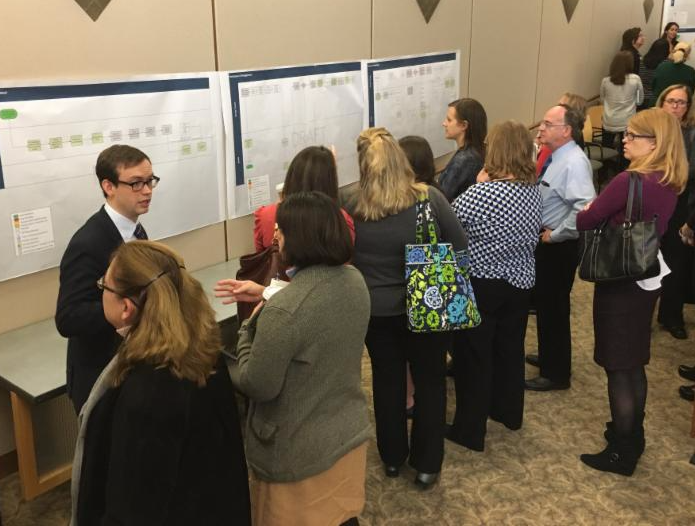 how their services have been utilized by Medical School researchers. The sessions will be held in the Research Auditorium of NCRC Building 10 on the morning of the 11th, and include:
how their services have been utilized by Medical School researchers. The sessions will be held in the Research Auditorium of NCRC Building 10 on the morning of the 11th, and include:
|
Protein Folding Diseases Initiative Symposium
|
3rd annual event on Thursday, October 13
|
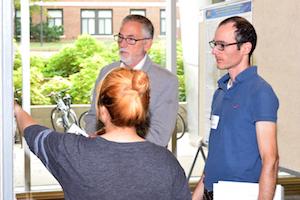
The University of Michigan's Protein Folding Diseases Initiative will be holding its 3rd Annual Symposium, "Protein Folding Disease: Found in Translation," on Thursday, October 13.
This symposium will be highlighting four disease groups central t
o the Protein Folding Diseases Initiative with lectures by clinical and scientific experts at the
University. Our keynote speaker will be Adriano Aguzzi, M.D., Ph.D., Pro
fessor and Director of the Institute of Neuropathology, University of Zurich. Dr. Aguzzi will be presenting, "Biology of Mammalian Prions."
|
Thursday, October 13
9:00 AM - 5:00 PM
Kahn Auditorium, BSRB
|
Please register for this free event. For more information, contact Catherine Bearman.
|
Join a Team Achieving Major Impact
|
|
Become an R01 Boot Camp coach or mentee
|

Are you eager to make an impact with your research? Do you want to learn what it takes to become a successfully funded faculty researcher?
The U-M Medical School Office of Research is currently accepting applications for the 2017 Cohort of its successful
R01 Boot Camp program.
|
Applications for both coaches and mentees are due
Monday, October 17.
|
To date, previous mentees have brought in more than 100 new awards as PIs, totaling more than $67 million. Within 12 months of completing the program, about 35% of mentees who submit proposals are awarded their first R01s.
R01 Boot Camp is an intensive mentorship program designed to help early career faculty receive their first NIH Research Project Grants (R01, or equivalent). While developing proposals over the 10-month course, mentees participate in a
variety of workshops that provide necessary skills such as grant writing techniques and budget tips and tricks.
Throughout the program, mentees are guided by faculty coaches with established track records of external funding. They also receive 1:1 counsel from an Internal Subject Matter Expert who helps review research plans and proposal drafts.
If you are interested in participating as either a
mentee (faculty who have not yet been PIs on R01 grants) or
coach (senior faculty who have a history of NIH funding and an interest in mentoring), please complete the brief application on
UMMS Competition Space.
|
Attend the Heinz C. Prechter Bipolar Research Fund Lecture
|
10th annual lecture on Wednesday, October 19
|
|
Initiated in 2007, this lecture series brings distinguished researchers to U-M to give talks on bipolar genetics and spend time collaborating with U-M research teams.
This year, Mimi Baird, author of "He Wanted the Moon: The Madness and Medical Genius of Dr. Perry Baird and His Daughter's Quest to Know Him," will give a lecture and host a panel discussion about the present and future of research in bipolar disorder. A reception will follow the lecture, and the
signed book will also be available for purchase at the event.
|
Wednesday, October 19
6:00 PM - 9:00 PM
Kahn Auditorium, BSRB
|
This event is free and open to the public, but registration is strongly encouraged. For more information, please contact Kat Bergman.
|
|
Central Biorepository to Host Great Lakes Biorepository Research Network Meeting at NCRC
|
Third annual meeting will be held on October 28
|
Dr. Kristin Ardlie from the Broad Institute of Harvard, will give the keynote address: "The Genotype-Tissue Expression Project: Unleashing the Potential of a Multi-Individual, Multi-Tissue Sample Collection."
Additional speakers and talks include:
Douglas Ruden, Ph.D., Wayne State University
"Using the Michigan Neonatal Biobank Biorepository to Show Multigenerational Epigenetic Effects of Lead Exposure"
Tom Tomlinson, Ph.D., Michigan State University
"Preferences for Biobank Consent Policy are Sensitive to Concerns about Future Uses"
Stewart Graham, Ph.D., Beaumont Health System
"Multiple Omics Approaches to Understanding Autism Spectrum Disorders (ASD) in Post-Mortem Human Brain"
Charles Burant, M.D., Ph.D., University of Michigan
"Take My Fat, Please! Sharing in Weight Loss"
Melvin McInnis, M.D., University of Michigan
"Reactivity and Excitability in Bipolar Disorder: Data Frontiers and Challenges"
Scott Jewell, Ph.D., Van Andel Research Institute "Scientific Discussions of the Clinical Proteomic Tumor Analysis Consortium."
|
Friday, October 28
8:00 AM - 2:00 PM
NCRC Dining Hall
|
GLBRN is a society of institutions dedicated to raising the quality of collection, processing, storage, and distribution of biospecimens. The organization is committed to providing a high degree of biospecimen and data stewardship, increasing opportunities for biospecimen use, quick access to biospecimens, and inspiring research collaborations.
Join the Central Biorepository for lunch after the conference to learn more about how to benefit from and participate in the GLBRN. See the full agenda and register at the
GLBRN website. Questions? Contact
Victoria Blanc.
|
Library Launches Research Data Repository
|
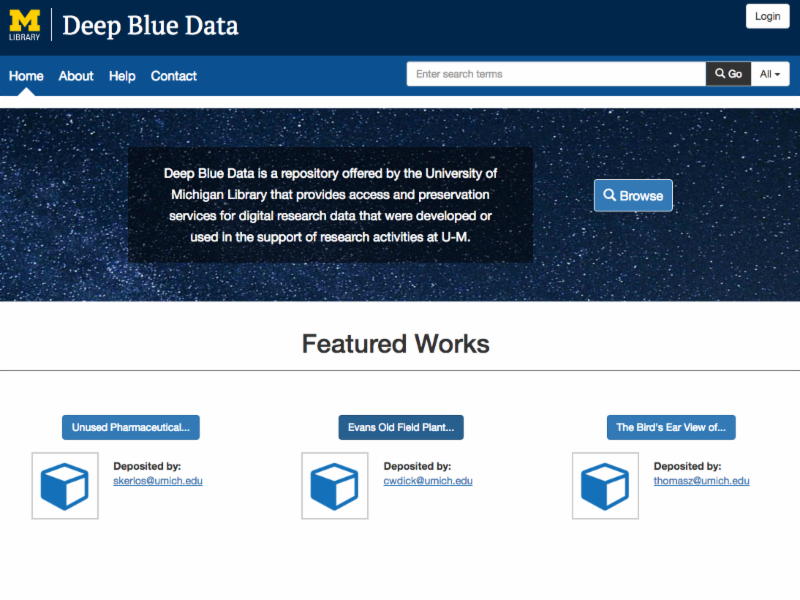
The U-M Library recently announced the launch of Deep Blue Data, a new research data repository. Deep Blue Data is a new platform specialized for datasets that enables U-M researchers to meet data-sharing mandates and to make their research data available to colleagues and peers throughout the world.
The NIH 2015 Plan for Increasing Access to Scientific Publications and Digital Scientific Data from NIH Funded Scientific Research states, "The sharing and preservation of data advances science by broadening the value of research data across disciplines and to society at large, protecting the integrity of science by facilitating the validation of results, and increasing the return on investment of scientific research."
Deep Blue Data provides U-M faculty with a convenient way to preserve research data in compliance with funder or publisher mandates, and to share data for future re-use.
Deep Blue Data is a strategic initiative of the Provost and an expansion of Deep Blue, the university's institutional repository, which was established in 2006 and currently holds more than
110,000
deposits. It can also assign a Digital Object Identifier (DOI) upon deposit, making it easier to properly attribute research data. Deep Blue Data is not configured to accept sensitive data or any other data under the purview of U-M Research Compliance Programs.
The Taubman Health Sciences Library can partner with researchers through all phases of the research lifecycle, from finding funding to developing data sharing plans and archiving research data. Please contact your informationist or [email protected] for more information.
|
|
Nutrition Assessment Lab Available to Meet Your Research Needs!
|
Are you designing a research study involving dietary, physical activity/exercise, body composition, and/or metabolic measurements or interventions in human subjects? The Michigan Nutrition Obesity Research Center's Human Phenotyping Core (HPC) provides the following services:
- Consultation services to investigators. HPC has the expertise to help you optimize the design of your study.
- Standardized and sophisticated assessment and physiological testing of human subjects. The HPC has the equipment and the expertise to implement a wide array nutritional assessments and physiological/metabolic tests for your research studies.
- Services to directly assist researchers to conduct their nutritional and/or exercise interventions in human subjects.
Dr. Simon Evans is about to begin an intervention study to determine how a diet high in polyunsaturated fatty acids alters the microbiome composition and influences self-reported burden of disease in individuals with bipolar disorder compared to healthy controls. Members of the Nutrition Assessment Lab provided consultative services to assist in determining appropriate dietary assessment methods. In addition, staff RDs will provide counseling to participants in following a high polyunsaturated fat diet and will train participants in how to operate self-administered 24-hour recall software.
For more information and a list of services, please visit the MNORC website or email the NORC Human Phenotyping Core.
|
|
Clinical Investigator Orientation
|
Attendance at one of these sessions REQUIRED for new faculty engaged in human research
|
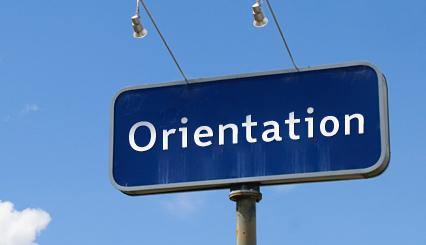 MICHR
MICHR, in partnership with
Clinical Trial Support Office, will offer an Orientation for Clinical Investigators. The orientation is designed for early-career faculty or experienced researchers new to clinical research at U-M. This 4-hour session will provide participants with:
- An orientation to information, resources, and tools necessary to navigate the University's research enterprise
- A basic understanding of what is needed to comply with regulations related to clinical research
Participants will learn information about IRBMED, regulatory affairs, conflict of interest, audits and monitoring, ClinicalTrials.gov, clinical research finances, and U-M resources for clinical trials research.
The in-person program is required for new faculty who will be engaged in any research that involves interaction with human subjects.
To accommodate faculties' busy schedules, the in-person program is offered on three different half-days. Attendance at only one session is required:
October 19
|
1:30pm-5:30pm
|
Danto Auditorium, CVC
|
October 25
|
1:30pm-5:30 pm
|
Danto Auditorium, CVC
|
November 29
|
8:00am-12:00pm
|
Dining Room, Towsley Center
|
There is no charge to you or your department for your participation.
Registration is required. Please contact
[email protected] with any questions about faculty orientation.
|
|
Featured Foundation Grants
for Biomedical Research
|

Michigan Health Endowment Fund - Research Grant
The aim of the 2017 Nutrition and Healthy Lifestyles Grant is to identify and support projects that are innovative and directly linked to food, health, and wellness. Priority will be given to projects that have an emphasis on children. The fund recognizes that family involvement is a key component to healthy behavior change and is interested in projects that adopt a multigenerational approach to addressing children's needs.
The deadline for concept paper submission is Friday, October 28 and the deadline for the full proposal (if invited) is Friday, November 11.
|
Award
|
Amount
|
Deadline
|
|
|
$500K
|
Friday,
November 11
|
Doris Duke Charitable Foundation - Clinical Scientist Development Award
The
Doris Duke Clinical Scientist Development Award
provides grants to junior physician scientists to facilitate their transition to independent clinical research careers. Pre-proposals are being sought from junior physician-scientist faculty conducting clinical research in any disease area. It is recommended that applicants have significant research experience and strong publication records consistent with the assistant professor rank.
In keeping with the wishes expressed in Doris Duke's will, experiments that use animals or primary tissues derived from animals will not be supported by this program.
|
Award
|
Amount
|
Deadline
|
|
|
$495K
|
Tuesday,
November 29
|
McKnight Endowment Fund for Neuroscience - Research Grant
These awards encourage and support scientists working on the development of novel and creative approaches to understanding brain function. Technology may take any form, from biochemical tools and instruments to software and mathematical approaches. Because the program seeks to advance and enlarge the range of technologies available to the neurosciences, research based primarily on existing techniques will not be considered. A goal of the Technology Awards is to foster collaboration between the neurosciences and other disciplines; therefore, collaborative and cross-disciplinary applications are explicitly invited.
Competition is very intense, so we encourage applicants to re-apply.
|
Award
|
Amount
|
Deadline
|
|
|
$200K |
Monday,
December 5 |
Simons Foundation - Pilot and Research Awards
|
Award
|
Amount
|
Deadline
|
|
|
$825K
|
Friday,
December 9
|
Howard Hughes Medical Institute - Fellows Program
The Howard Hughes Medical Institute (HHMI) recognizes the value of individuals from different backgrounds to move science forward and seeks to increase diversity in the biomedical research community. Through the new Hanna H. Gray Fellows Program, HHMI will recruit and retain individuals from groups underrepresented in the life sciences. The program will support early career scientists with the potential to become leaders in academic research. Through their successful careers, Hanna H. Gray Fellows will inspire the next generation of scientists from America's diverse talent pool.
| Award |
Amount |
Deadline |
|
|
$1.4M
|
Wednesday, February 15, 2017
|
Questions about these award opportunities should be directed to Joe Piffaretti in UMHS Corporate and Foundation Relations via email at
[email protected]
or phone at (734) 763-1318.
If you are interested in receiving weekly funding announcements that include opportunities such as those listed above, please contact Joe Piffaretti to be added to the faculty/staff email circulation list.
|
|
Sharpening Your Focus:
Tips on Grant Proposal Preparation
|

By Jill Jividen, Ph.D., Senior Manager
for Research Development Support,
U-M Medical School Office of Research
(One in a
series
of tips published in UMMS Research News about writing proposals.)
It is incumbent upon researchers to share the results of their work, and they do so regularly to peers via scholarly dissemination, including publishing in journals and presenting at conferences. But researchers have a vested interest in communicating the outcomes and impact of their work to a broader audience - particularly when researchers depend on public funds to do their work (i.e., taxpayers like to know there their money goes).
The good news: it's easier than ever to communicate your science to the public. But you'll want to consider the most effective ways to do it, given the prevalence of digital options, your time constraints, and readers' short attention spans.
In our first Communicating Science Seminar on September 15, "
Public Relations and External Audience Communications," UMHS public relations expert Kara Gavin offered several strategies for connecting with non-scientists. The UMHS Department of Communications can assist on many of these options:
- Work with UMHS Communications to create a PR plan for major events like publications, grants, and scientific breakthroughs; they will act as liaisons between faculty and the press and can advise on interviews, etc.
- The Communications office will help put your news in places where other sources can use it, such as on U-M outlets (e.g., UMHS headlines, michiganhealthlab.org).
- Researchers can engage directly via social media sites like Twitter, LinkedIn, Doximity, and ResearchGate. These are good for connecting with people in your field, sharing new findings, promoting publications, and other activities. Be sure to use lay language and enhance posts with visuals whenever possible.
- Join The Conversation, a platform to help academics reach the public on timely topics, often republished by major media outlets.
Resources
|
|
|